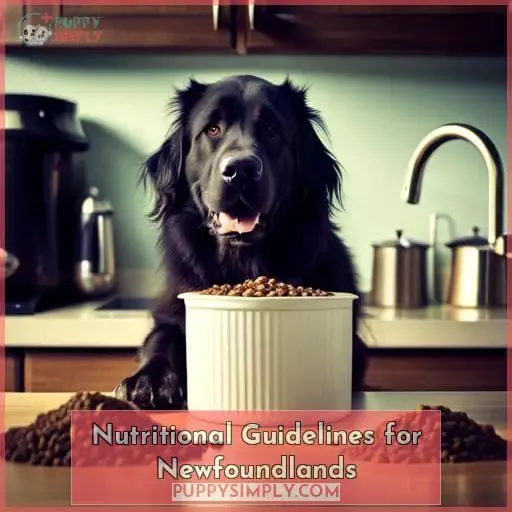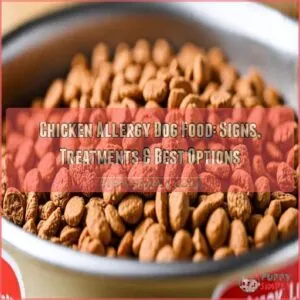This site is supported by our readers. We may earn a commission, at no cost to you, if you purchase through links.
 Imagine the joy on your Newfoundland’s face as you serve up a homemade meal that is not only delicious but also packed with nutrients.
Imagine the joy on your Newfoundland’s face as you serve up a homemade meal that is not only delicious but also packed with nutrients.
- Promoting healthy eating habits
- Providing better portion control
However, it’s crucial to be aware of the risks and ensure that the meals are nutritionally balanced. In this article, we will explore the benefits, risks, and nutritional guidelines for feeding your Newfoundland homemade dog food.
Table Of Contents
- Key Takeaways
- Benefits of Homemade Dog Food for Newfoundlands
- How Homemade Diet Helps Newfoundland Health Issues
- Risks of Homemade Dog Food for Newfoundlands
- Nutritional Guidelines for Newfoundlands
- Recommended Supplements and Dietary Changes
- Choosing the Best Food for Your Newfoundland Dog
- Newfoundland Homemade Dog Food Benefits
- Food and Newfoundland Health: Why Feed Homemade?
- Newfoundland Homemade Dog Food Risks
- Newfoundland Nutritional Guidelines to Follow
- Frequently Asked Questions (FAQs)
- Can I feed my Newfoundland a homemade diet without any supplements?
- Are there any specific ingredients I should avoid when making homemade dog food for my Newfoundland?
- How do I ensure that the homemade dog food I prepare meets all of my Newfoundland’s nutritional needs?
- Can I feed my Newfoundland a raw diet instead of homemade cooked food?
- Are there any specific health conditions that may require modifications to the homemade dog food diet for my Newfoundland?
- Conclusion
Key Takeaways
- Homemade dog food for Newfoundlands promotes healthy eating habits and provides better quality control over ingredients.
- It can be more affordable in the long run and helps with portion size control for weight management.
- However, there are risks and considerations to be aware of, including the potential for nutrient deficiencies and taurine deficiency, as well as an increased risk of Dilated Cardiomyopathy (DCM).
- To ensure a well-balanced diet, it is important to consider the age, breed-specific needs, and nutrient requirements of Newfoundlands and consult with a vet or professional in pet nutrition.
Benefits of Homemade Dog Food for Newfoundlands
When it comes to feeding your Newfoundland, homemade dog food offers several benefits.
Firstly, it promotes healthy eating habits by encouraging nutritious and balanced meals that support their overall well-being.
Additionally, homemade dog food allows for quality control as you can ensure the use of high-quality ingredients while reducing the risk of additives and preservatives found in commercial options.
Lastly, making your own dog food can be more affordable than purchasing expensive brands and allows for healthier portion size control to prevent overfeeding and obesity.
Promotes Healthy Eating Habits
Making homemade dog food for your Newfoundland promotes healthy eating habits.
By preparing nutritious and balanced meals, you can ensure that your dog receives the essential nutrients they need to support their overall well-being.
Homemade dog food also allows for quality control, reducing the risk of additives and preservatives found in commercial options.
Additionally, providing fresh ingredients enhances palatability and nutritional value, promoting a healthier diet for your beloved pet.
Quality Control
Why is quality control important when preparing homemade dog food for your Newfoundland?
Quality control ensures that the homemade dog food you prepare for your Newfoundland is safe, nutritious, and meets their specific dietary needs.
-
Ingredient Safety
- With complete oversight during preparation stage where one has ultimate say regarding what goes into bowl before feeding commences; rest assured knowing nothing unsafe slips past radar undetected!
- Minimizes any potential risks posed by using subpar-quality items found within store-bought counterparts which could contain harmful additives such as artificial colors/flavors/preservatives causing adverse reactions among dogs consuming them regularly.
-
Nutritional Balance
- By taking charge over each ingredient used, ensuring right proportions are added into recipe; homemade meals prepared specifically for Newfoundland breed guarantee proper balance between essential nutrients necessary maintaining overall health & well-being.
- Avoiding issues related malnutrition/over-nutrition allows Newfoundlands remain at optimal weight while enjoying tasty cuisine tailored their specific dietary requirements without compromising on taste!
-
Health Monitoring
- Homemade dog food provides unique opportunity closely monitor your pet’s wellbeing as you have access to real-time updates regarding their physical condition.
- Regularly weigh them track progress achieved towards achieving desired healthy weight goals encourage responsible feeding habits contributing long-term success stories where beloved companions live healthier lives thanks in part due introduction nutritious recipes served daily basis promoting longevity!
More Affordable
If you’re looking for a budget-friendly option that doesn’t compromise on the quality of your Newfoundland’s nutrition, homemade dog food can be more affordable compared to some commercial options.
By preparing meals at home using simple and wholesome ingredients, you can save money while still providing your furry friend with nutritious meals tailored to their needs.
Check out the table below for cost savings comparison between homemade recipes and commercial dog foods:
| Homemade Dog Food | Commercial Dog Food |
|---|---|
| Lower Cost | Higher Cost |
| Budget-Friendly | Expensive |
| Economic Benefits | Pricey |
Making homemade dog food not only allows you to have control over what goes into your Newfoundland’s diet but also helps in saving costs without compromising on their nutrition.
Healthier Portion Size Control
Maintaining healthier portion size control is a key benefit of homemade dog food for Newfoundlands, helping you prevent overfeeding and obesity.
- Allows for precise portion management.
- Helps maintain weight management in overweight Newfoundlands.
- Promotes nutritional balance and prevents nutrient deficiencies.
- Supports better digestion, reducing the risk of a sensitive stomach.
Fresh Ingredients
To ensure the optimal health and well-being of your Newfoundland, it’s essential to incorporate fresh ingredients into their homemade dog food.
Fresh ingredients provide numerous nutritional benefits for your furry friend.
By following homemade dog food guidelines and making dietary adjustments, you can provide healthier eating options for your Newfoundland.
Consider using real meat selections in their high-protein diet to support muscle development and overall wellness.
Additionally, consult with a vet about appropriate dog food supplements to enhance their nutrition even further.
How Homemade Diet Helps Newfoundland Health Issues
A homemade diet can greatly benefit the health of your Newfoundland dog by addressing specific health issues.
Increased lifespan, allergy prevention, obesity and joint health, improved nutrient bioavailability, and reduced cancer risk are all potential advantages of feeding your Newfoundland a homemade diet.
By providing fresh ingredients and tailoring the meals to their individual needs, you can promote optimal well-being for your beloved pet.
Increased Lifespan
By feeding your Newfoundland a homemade diet, you can increase their lifespan while addressing various health issues they may face.
Homemade diets provide longevity benefits and contribute to healthier aging in Newfoundlands.
By ensuring proper nutrition and avoiding potential risks associated with commercial dog food, you can support your Newfoundland’s nutritional longevity and overall well-being.
With a homemade diet tailored to their specific needs, you can give your beloved companion the best chance at living a long and healthy life.
Allergy Prevention
Prevent allergies in your Newfoundland by feeding them a homemade diet that’s tailored to their specific nutritional needs.
- Nutritional Benefits: Homemade diets allow you to carefully select ingredients that are beneficial for your dog’s health and immune system.
- Allergy Management: You have control over ingredient selection, reducing the risk of potential allergens present in commercial foods.
- Ingredient Selection: Avoiding common allergens like grains or artificial additives helps manage and prevent allergies in Newfoundlands.
Allergies can be a common issue among dogs, including Newfoundlands. Feeding your Newfoundland a homemade diet can help prevent allergies through several key factors:
- Nutritional Benefits: When preparing homemade dog food, you have full control over selecting high-quality ingredients rich in essential nutrients such as proteins, carbohydrates, fats vitamins and minerals necessary for optimal health.
- Allergy Management: Commercial dog foods often contain potential allergenic ingredients such as grains or artificial additives which may trigger allergic reactions or sensitivities in some dogs like Newfoundlands with sensitive skin conditions leading to itching problems. A homemade diet allows you to carefully choose ingredient sources based on individual dietary needs while minimizing exposure to known allergens.
- Ingredient Selection : One of the main advantages of preparing your own doog food at home is being able ot avoid certain potentially toxic foods foir dogs , harmful substances used but also those not suitable for canine consumption found on commercial pet products The careful selection of wholesome fruits vegetables protein sources (suchas lean meats,poultry,fish), wholegrains(brown rice,oats),and healthy fats(oil,vitamin E supplement ) ensures quality nutrition without unnecessary fillers chemicals
By providing a well-balanced homemade diet specifically designed around their nutritional requirements,you are givingyour newfoundlandthe best possible chanceof avoidingallergies and maintainingoptimalhealth.
Keep in mind that it’s always important to consult with your veterinarian or a qualified veterinary nutritionist when formulating a homemade diet for your Newfoundland dog. They can provide you with valuable guidance on ingredient selection, portion sizes, and any necessary supplements to ensure complete and balanced nutrition while preventing allergies.
Obesity and Joint Health
If you’re considering a homemade diet for your Newfoundland, it can help address obesity and joint health concerns.
Obesity prevention is crucial as excess weight puts strain on their joints, leading to increased risk of arthritis and other joint issues.
Homemade recipes allow for precise portion control and the ability to prioritize nutritional balance, ensuring your dog maintains a healthy weight while receiving essential nutrients for optimal joint health.
This approach also helps manage allergies that may contribute to inflammation in the joints.
Improved Nutrient Bioavailability
To improve nutrient bioavailability and support overall health, a homemade diet provides Newfoundland dogs with essential nutrients they need.
Homemade dog food promotes improved digestion and nutrient absorption, leading to better utilization of the nutrients in their meals.
This increased nutritional efficiency can result in numerous health benefits for Newfoundlands, including:
- Enhanced energy levels
- Stronger immune function
- Healthier skin and coat
- Improved weight management
- Reduced risk of chronic diseases like cancer or heart disease
- All contributing to a happier and healthier life for your beloved Newfoundland companion.
Reduced Cancer Risk
By incorporating a homemade diet into your Newfoundland’s feeding routine, you can significantly reduce their risk of developing certain types of cancer.
Here are five ways a homemade diet helps reduce cancer risk for Newfoundlands:
- Provides essential antioxidants that support immune function and fight against free radicals.
- Avoids potential carcinogens found in processed commercial dog foods.
- Includes fresh fruits and vegetables that contain anti-cancer compounds.
- Allows for better control over the quality and sources of ingredients to avoid harmful additives or contaminants.
- Supports overall health and immunity, which plays a crucial role in preventing cancer development.
Risks of Homemade Dog Food for Newfoundlands
When it comes to homemade dog food for Newfoundlands, there are several risks that you need to be aware of.
One major risk is:
- Not understanding your dog’s nutritional needs, which can lead to deficiencies or imbalances in their diet.
Another risk is:
- Using inadequate or dangerous recipes that may harm your Newfoundland’s health.
Additionally, preparing unbalanced meals and using unsafe or harmful ingredients can also pose a threat to your dog’s well-being.
It’s important to take these risks into consideration and ensure that you have the proper knowledge and guidance when making homemade dog food for your Newfoundland.
Not Understanding Nutritional Needs
You need to educate yourself about your Newfoundland’s nutritional needs in order to avoid potential risks when preparing homemade dog food.
Not understanding the specific dietary requirements of your Newfoundland can lead to nutritional deficiencies or imbalances in their diet.
It’s essential that you acquire the necessary knowledge and education about balanced diets for dogs, including understanding their protein, carbohydrate, fat, mineral, water, and vitamin needs.
This will ensure that you provide a well-rounded and nutritionally adequate homemade diet for your beloved Newfoundland companion.
Using Inadequate or Dangerous Recipes
How can using inadequate or dangerous recipes for homemade dog food put your Newfoundland’s health at risk?
The risk of using unverified recipes is that they may fail to provide a well-rounded diet, leading to nutritional deficiencies and imbalances.
In addition, these recipes may include toxic or harmful substances that could potentially harm your dog’s health.
Furthermore, if you have a Newfoundland with existing conditions such as dilated cardiomyopathy (DCM), an inadequate homemade diet could worsen their condition.
It’s crucial to ensure the safety and adequacy of the recipes you use for your beloved Newfoundland.
Preparing Unbalanced Meals
To avoid the risks of homemade dog food for Newfoundlands, it’s essential to ensure that you prepare well-balanced meals.
Unbalanced meals can lead to nutrient deficiencies and nutritional imbalances, which may result in health issues over time.
It’s crucial to consult with a vet or a veterinary nutritionist when creating your Newfoundland’s homemade diet to ensure it meets their specific needs and avoids harmful ingredients.
Properly balanced meals will help maintain your dog’s overall health and well-being.
Using Unsafe or Harmful Ingredients
When preparing homemade dog food for your Newfoundland, it’s crucial to be mindful of the potential risks associated with using unsafe or harmful ingredients.
Some ingredients pose potential hazards, such as raw meat that may contain bacteria and lead to food poisoning.
Additionally, certain foods like onions, garlic, and chocolate can be toxic to dogs.
It’s important to avoid artificial additives and growth hormones in order to prioritize your Newfoundland’s health.
Choose USDA certified meats for a safer option when making homemade dog food.
Neglecting Dog’s Health Conditions
Don’t neglect your Newfoundland’s health conditions when preparing homemade dog food. It’s important to consider potential hazards and harmful ingredients that can worsen existing health issues.
Newfoundlands are prone to dilated cardiomyopathy (DCM) possibly linked to taurine processing, so breed-specific diets and nutritional requirements should be met.
Additionally, rotation diets can help reduce food intolerances while joint supplements and multivitamins may support overall health.
Stay mindful of DCM in Newfoundland dogs, their heart issues, obesity risks, proper puppy food, and the unique temperament of this breed.
Nutritional Guidelines for Newfoundlands
When it comes to providing proper nutrition for your Newfoundland, there are several important guidelines to keep in mind.
Ensuring that your dog receives the essential nutrients they need is crucial for their overall health and well-being. Factors such as weight, health conditions, size, activity level should be considered when determining their dietary needs.
Following AFFCO guidelines and calculating caloric needs based on weight can help ensure that you’re meeting these requirements. Additionally, special considerations should be made for pregnant or lactating Newfoundlands in order to support their reproductive needs and provide optimal nutrition for both mother and puppies.
Essential Nutrients
As you consider feeding homemade dog food to your Newfoundland, it’s important to understand the essential nutrients necessary for their optimal health and well-being.
These include:
- Protein for muscle development
- Carbohydrates for energy
- Fat for insulation and organ protection
- Minerals for various bodily functions
- Water to maintain hydration
Meeting these nutritional requirements through a balanced diet is crucial in ensuring that your Newfoundland receives the proper nourishment they need to thrive.
Consider Weight, Health Conditions, Size, and Activity Level
To ensure optimal nutrition for your Newfoundland, consider their:
- Weight
- Health conditions
- Size
- Activity level
When determining their dietary needs, you should:
- Monitor weight and health regularly
- Provide a variety of protein sources in the diet
- Consider using a rotation diet to reduce food intolerances
- Be aware of the risk of taurine deficiency and Dilated Cardiomyopathy (DCM)
- Tailor the feeding plan to meet the specific needs of your Newfoundland
AFFCO Guidelines
Ensure that you follow AFFCO guidelines when preparing homemade dog food for your Newfoundland, as they provide important nutritional guidelines tailored to meet the specific needs of this breed.
These guidelines emphasize the importance of including fresh, high-protein meat, bones, and organs in their balanced diet.
By incorporating natural whole foods into their meals based on species-appropriate recommendations from AFFCO, you can ensure that your Newfoundland receives a nutritionally appropriate homemade dog food diet.
Caloric Needs Based on Weight
To determine the appropriate caloric needs for your Newfoundland, consult with a veterinarian or use an online calculator based on their weight and activity level.
Caloric needs vary depending on factors such as growth, weight gain or loss, and pregnancy.
It’s important to provide your dog with the right amount of calories to maintain a healthy weight and overall well-being.
Consulting with professionals will ensure that you meet your Newfoundland’s specific caloric requirements for optimal nutrition.
Special Considerations for Pregnant or Lactating Newfoundlands
When it comes to the nutritional guidelines for pregnant or lactating Newfoundlands, it’s important to consider their specific needs and make appropriate adjustments.
Pregnant or lactating Newfoundlands have increased caloric and nutrient needs to support their reproductive functions. They may also experience possible food aversions and digestive issues during pregnancy.
Providing the best homemade food for Newfoundland dogs includes ensuring prenatal nutrition through a balanced diet tailored to meet their unique requirements.
Recommended Supplements and Dietary Changes
When it comes to providing the best nutrition for your Newfoundland dog, there are certain supplements and dietary changes that can be beneficial.
- Multivitamins tailored to specific health issues can help address any deficiencies or imbalances in their diet.
- Consulting with a vet nutritionist will ensure that you’re making informed decisions about your dog’s nutritional needs.
- Additionally, making necessary dietary adjustments based on coat color changes, GI signs, itching, and monitoring weight and health is crucial for maintaining optimal well-being.
- It’s also important to be aware of foods to avoid in order to protect your Newfoundland from potential hazards.
Multivitamins for Specific Health Issues
Consider adding multivitamins to your Newfoundland’s diet for specific health issues.
Consult with a veterinarian to determine the appropriate dosage, frequency, and potential side effects of these supplements.
Multivitamins can address nutritional deficiencies and support your dog’s overall well-being.
It’s important to ensure the efficacy and safety of the chosen multivitamin by researching its ingredients and any potential interactions with other medications or health conditions that your Newfoundland may have.
Consultation With Vet Nutritionist
It’s important to regularly consult with a vet nutritionist for personalized advice on recommended supplements and dietary changes for your Newfoundland dog.
A vet nutritionist can provide valuable insights into your dog’s specific nutritional needs and help you make informed decisions about their diet.
They can recommend the best food options, suggest appropriate supplements, and address any health concerns or conditions that may require dietary modifications.
Consulting with a vet nutritionist ensures that your Newfoundland receives optimal nutrition for their overall well-being.
Dietary Adjustments for Coat Color Changes, GI Signs, Itching, Etc
To address coat color changes, GI signs, itching, and other issues in your Newfoundland dog’s health, make dietary adjustments and incorporate recommended supplements for optimal well-being.
Consider introducing hypoallergenic or limited ingredient diets to alleviate food allergies and skin issues.
Opt for high-quality protein sources like salmon or venison to support a healthy coat color. Additionally, add omega-3 fatty acids from fish oil to reduce inflammation and itching in your dog’s diet.
Importance of Monitoring Weight and Health
Monitor your Newfoundland dog’s weight and overall health regularly to ensure they’re maintaining a healthy lifestyle.
Regular vet visits are essential for:
- Tracking their weight
- Identifying any potential issues
- Making necessary dietary changes
If your Newfoundland is overweight, consult with your vet to develop a tailored diet plan that promotes gradual weight loss while ensuring they still receive all the necessary nutrients.
Additionally, monitoring their health helps identify any food intolerances or sensitivities that may require adjustments in their diet for optimal well-being.
List of Foods to Avoid for Newfoundland Dogs
When feeding your Newfoundland dog a homemade diet, it’s important to be aware of the list of foods to avoid in order to ensure their health and well-being.
Here are some foods that should be avoided when preparing homemade meals for your beloved Newfoundland:
| Foods to Avoid | Potential Risks |
|---|---|
| Chocolate | Toxicity |
| Grapes | Kidney damage |
| Onions | Hemolytic anemia |
| Garlic | Gastrointestinal upset, anemia |
| Macadamia nuts – Weakness, vomiting,dogs can’t metabolize them properly |
By avoiding these harmful ingredients, you can protect your Newfoundland from potential health hazards and provide them with a safe and nutritious diet.
Choosing the Best Food for Your Newfoundland Dog
When choosing the best food for your Newfoundland dog, there are several factors to consider.
Firstly, you should take into account any specific health issues or allergies that your dog may have.
Secondly, it’s important to understand the different types of diets available for Newfoundlands, such as kibble, raw diets, and home-cooked meals.
Lastly, keep in mind that not all internet recommendations are reliable and consult with professionals who can provide personalized advice based on your dog’s needs and nutritional requirements.
Considerations for Newfoundland Dog Food Selection
When selecting the best food for your Newfoundland dog, it’s important to consider various factors that will ensure their nutritional needs are met and promote their overall health and well-being.
Newfoundlands may have skin and food allergies, heart issues, or be prone to obesity. It’s crucial to prioritize a high-quality diet with the right nutrients over quantity. Additionally, considering a rotation diet can help diversify protein sources and potentially reduce food intolerances.
For Newfoundland puppies, choosing an appropriate giant breed puppy food is essential for proper growth and development.
Types of Diets for Newfoundland Dogs
To determine the best food for your Newfoundland dog, you should consider different types of diets that cater to their specific nutritional needs and health requirements.
Options include a kibble diet, raw diet, or home cooked diet.
It’s important to choose an appropriate diet brand that meets your dog’s needs.
Another option is a rotation diet, which involves switching between different types of food to provide variety and potentially reduce food intolerances.
Consider consulting with professionals for guidance on selecting the most suitable nutrition plan for your Newfoundland dog.
Factors to Keep in Mind During the Food Selection Process
Consider your Newfoundland dog’s specific needs and health history when selecting the best food for them.
To ensure you make an informed decision, avoid pushy advice and trust your knowledge of your dog’s unique requirements.
Consider a rotation diet to diversify protein sources and consult with professionals to evaluate your dog’s diet.
Ultimately, choose an appropriate diet that provides the necessary nutrition for optimal health and well-being.
Choosing Food for Newfoundland Puppies
As you select the best food for your Newfoundland puppy, it’s important to consider their specific nutritional needs and growth requirements.
Giant breed puppies like Newfoundlands require a diet with proper calcium content and an appropriate calcium/phosphorus ratio to support healthy bone development.
Look for high-quality protein sources and ensure a balanced diet that promotes a healthy weight and good coat.
Avoid potential food intolerances by considering a rotation diet that diversifies protein sources.
Prioritize minimal health issues by providing your Newfoundland puppy with a suitable diet.
| Considerations | Protein Sources | Calcium Content |
|---|---|---|
| Nutritional needs & growth requirements of Newfoundland puppies | High-quality animal proteins | Appropriate levels |
Evaluating Your Newfoundland Dog’s Diet
When evaluating your Newfoundland dog’s diet, it’s important to assess their overall health and well-being.
Look for signs of a healthy diet such as:
- Shiny coat
- Good energy levels
- Regular digestion
On the other hand, signs of an unhealthy diet may include:
- Dull fur
- Weight gain or loss issues
- Digestive problems
Consider making diet changes or adjustments based on their specific needs like:
- Introducing variety
- Finding appropriate food for overweight Newfoundlands or those with sensitive stomachs
Always consult with your veterinarian and follow AAFCO recommendations for a balanced nutrition plan.
Newfoundland Homemade Dog Food Benefits
When it comes to feeding your Newfoundland homemade dog food, there are several benefits worth considering.
Homemade meals allow you to:
- Promote healthy eating habits
- Have better quality control over the ingredients used
- Be more affordable in the long run
- Help with portion size control for weight management
Health benefits of homemade dog food for Newfoundlands
If you’re considering homemade dog food for your Newfoundland, you’ll be pleased to know that it offers numerous health benefits.
- Species-Appropriate Nutrition: Homemade dog food provides a diet that closely mimics what dogs would eat in the wild, promoting optimal health and well-being.
- Grain-Free Dog Food: By eliminating grains from their diet, Newfoundlands can avoid potential allergic reactions or digestive issues associated with grain consumption.
- Reduced Carbohydrates in Kibble: Homemade dog food allows for lower carbohydrate intake compared to commercial kibble options, which can lead to better weight management and overall health for Newfoundlands.
Risks and considerations of homemade dog food for Newfoundlands
When feeding your Newfoundland homemade dog food, it’s important to be aware of the risks and considerations associated with this dietary choice.
While a raw diet can mimic a species-appropriate nutrition for dogs, there are potential challenges such as ensuring balanced meals and appropriate carbohydrate content. It’s crucial to understand canine adaptability and strive for their thriving health.
Additionally, choosing grain-free dog food options may benefit Newfoundlands’ overall well-being when considering homemade diets.
Nutritional guidelines for feeding Newfoundlands homemade dog food
To ensure your Newfoundland receives optimal nutrition from homemade dog food, it’s important to follow specific nutritional guidelines.
Consider their age, breed-specific needs, and nutrient requirements.
Be aware of potential risks such as taurine deficiency and the increased risk of Dilated Cardiomyopathy (DCM).
Ensure a well-balanced diet with high-quality ingredients that meet their nutritional needs.
If considering a raw diet, prioritize food safety and choose high-protein meat options.
Consulting with a vet or professional in pet nutrition can help provide guidance on homemade dog food for Newfoundlands.
Food and Newfoundland Health: Why Feed Homemade?
Feeding homemade dog food to your Newfoundland is a smart choice for their overall health and well-being.
- Grain-Free Diet: Homemade dog food allows you to eliminate grains from your Newfoundland’s diet, which can provide numerous health benefits.
- Raw Diet: A raw diet offers the nutritional adequacy and species-appropriate diet that’s beneficial for optimal dog health.
- Avoiding Kibble Adverse Effects: Commercial kibble may have adverse effects on dogs, such as high carbohydrate content and nutrient denaturation during processing.
- Health Benefits of Fresh Food: Homemade dog food using fresh ingredients enhances the nutritional value of meals, promoting better overall health in Newfoundlands.
- Personalized Nutrition Plan: With homemade dog food, you have full control over what goes into their meals, allowing customization based on specific dietary needs.
By choosing to feed your Newfoundland homemade dog food, you can provide them with a grain-free or raw diet that promotes their well-being while avoiding potential risks associated with commercial kibble.
Newfoundland Homemade Dog Food Risks
Before diving into the benefits of homemade dog food for Newfoundlands, it’s important to address the potential risks involved.
While homemade dog food can offer numerous advantages, such as promoting healthy eating habits and providing quality control over ingredients, there are also risks that need to be considered.
One risk is nutrient deficiencies if the diet isn’t properly balanced or lacks essential nutrients like protein and vitamins.
Another concern is taurine deficiency, which has been linked to Dilated Cardiomyopathy (DCM) in dogs.
Unbalanced meals can lead to health issues over time, while harmful ingredients may pose a threat to your Newfoundland’s well-being.
Additionally, failing to account for specific health conditions when preparing homemade meals could worsen existing problems.
Newfoundland Nutritional Guidelines to Follow
Ensure your Newfoundland’s optimal health by following these essential nutritional guidelines.
When it comes to feeding your Newfoundland, there are a few key factors to consider.
First, pay attention to the calcium phosphorus ratio in their diet as imbalances can lead to skeletal issues.
Additionally, be mindful of taurine deficiency which can affect heart health in certain breeds including Newfoundlands.
Another important consideration is food allergies which may manifest as skin problems or digestive issues. If you notice coat color changes or gastrointestinal signs after switching diets, consult with a veterinarian for guidance on potential dietary adjustments.
Lastly, remember that each dog is unique and may have specific nutritional needs based on their weight, size,
and activity level so it’s crucial to tailor their diet accordingly.
Frequently Asked Questions (FAQs)
Can I feed my Newfoundland a homemade diet without any supplements?
Feeding your Newfoundland a homemade diet without supplements may lead to nutritional deficiencies. To ensure their optimal health, consult with a veterinarian or nutritionist who can guide you in providing the necessary nutrients for their unique needs.
Are there any specific ingredients I should avoid when making homemade dog food for my Newfoundland?
When making homemade dog food for your Newfoundland, be cautious of ingredients like onions and garlic that can cause serious health issues. It’s crucial to avoid potential hazards and prioritize your furry friend’s well-being.
How do I ensure that the homemade dog food I prepare meets all of my Newfoundland’s nutritional needs?
To ensure your homemade dog food meets all of your Newfoundland’s nutritional needs, consult a veterinarian or a veterinary nutritionist.
They can provide guidance on essential nutrients, portion sizes, and any necessary supplements for optimal health and well-being.
Can I feed my Newfoundland a raw diet instead of homemade cooked food?
Absolutely!
Feeding your Newfoundland a raw diet can be a liberating choice. It aligns with their natural instincts and provides them with the power of species-appropriate nutrition. Just ensure you follow proper guidelines to meet their nutritional needs effectively.
Are there any specific health conditions that may require modifications to the homemade dog food diet for my Newfoundland?
Certain health conditions in Newfoundlands may require modifications to their homemade dog food diet.
Consult a veterinarian for personalized advice based on your dog’s specific needs and ensure the diet aligns with their nutritional requirements.
Conclusion
To ensure the health and happiness of your Newfoundland, homemade dog food can be a beneficial option.
By promoting healthy eating habits and providing better portion control, homemade meals can contribute to your dog’s overall well-being.
However, it’s essential to be aware of the risks and ensure that the meals are nutritionally balanced.
Following nutritional guidelines and consulting with a vet nutritionist can help you create a safe and nutritious homemade diet for your beloved Newfoundland.
















